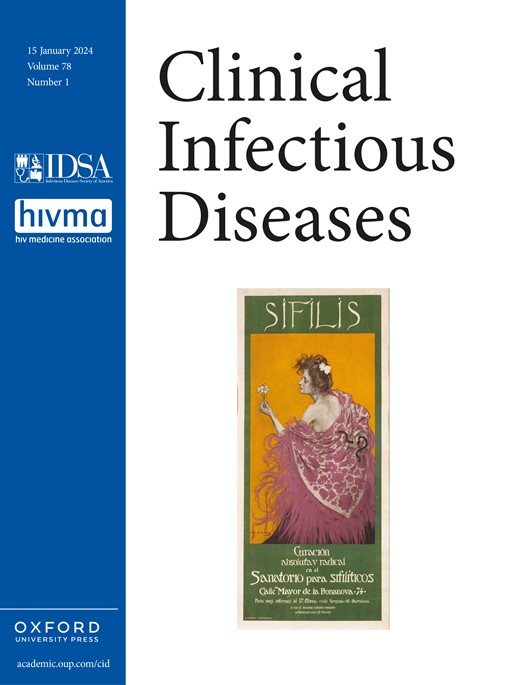Replacing Mycophenolate Mofetil by Everolimus in Kidney Transplant Recipients to Increase Vaccine Immunogenicity: Results of a Randomized Controlled Trial.
IF 8.2
1区 医学
Q1 IMMUNOLOGY
引用次数: 0
Abstract
BACKGROUND Vaccine immunogenicity is reduced in kidney transplant recipients (KTRs), especially in those using mycophenolate mofetil (MMF). Whether replacement of MMF by everolimus improves vaccine immunogenicity is unknown. METHODS KTRs were randomized 1:1 to continue MMF or switch to everolimus. Participants received one coronavirus disease 2019 (COVID-19) booster vaccination and two herpes zoster (HZ) vaccinations at 6, 10 and 14 weeks postrandomization. Primary outcome was the neutralizing antibody response 28 days after COVID-19 vaccination. Secondary outcomes included antibody and T-cell responses 28 days after COVID-19 and HZ vaccination, and safety. RESULTS In 110 KTRs, COVID-19 vaccination resulted in comparable Omicron XBB.1.5 neutralizing antibody titers in the everolimus versus MMF group (308 [74.4-1314] vs 327 [115-897]; P = .83), whereas severe acute respiratory syndrome coronavirus-2 (SARS-CoV-2) Spike-specific T-cell responses were slightly lower with everolimus (118 [32.1-243] vs 228 [113-381] spot-forming cells [SFCs]/106 peripheral blood mononuclear cells [PBMCs]; P = .02). HZ vaccination led to higher varicella zoster virus (VZV) glycoprotein E (gE)-specific immunoglobulin G titers with everolimus (2192 [888-4523] vs 1101 [440-2078] 50% endpoint titer; P = .004), while VZV gE-specific T-cell responses were similar (85.0 [27.5-155] vs 115 [50.0-258] SFCs/106 PBMCs; P = .24). Besides known side effects, everolimus led to more bacterial infections (27.3% vs 11.1%; P = .03). CONCLUSIONS Six weeks' replacement of MMF by everolimus in KTRs does not improve COVID-19 booster vaccine immunogenicity, whereas 10 weeks' replacement enhances humoral HZ vaccine immunogenicity. While replacing MMF by everolimus may improve vaccine responses, its timing and potential risks require careful consideration.在肾移植受者中用依维莫司替代霉酚酸酯以提高疫苗免疫原性:随机对照试验结果。
疫苗免疫原性在肾移植受者(KTRs)中降低,特别是在那些使用霉酚酸酯(MMF)的患者中。用依维莫司替代MMF是否能提高疫苗的免疫原性尚不清楚。方法按1:1随机分组,继续使用MMF或改用依维莫司。参与者在随机分组后的6周、10周和14周分别接种了1次2019冠状病毒病(COVID-19)强化疫苗和2次带状疱疹(HZ)疫苗。主要终点是COVID-19疫苗接种后28天的中和抗体应答。次要结果包括COVID-19和HZ疫苗接种后28天的抗体和t细胞应答,以及安全性。结果在110个KTRs中,依维莫司组与MMF组的Omicron XBB.1.5中和抗体滴度相当(308 [74.4-1314]vs 327 [115-897];P = .83),而依维莫司对严重急性呼吸综合征冠状病毒-2 (SARS-CoV-2)尖刺特异性t细胞的反应略低(118 [32.1-243]vs 228[113-381]斑点形成细胞[sfc]/106外周血单核细胞[PBMCs];P = .02)。HZ疫苗接种依维莫司可提高水痘带状疱疹病毒(VZV)糖蛋白E (gE)特异性免疫球蛋白G滴度(终点滴度为2192 [888-4523]vs 1101 [440-2078] 50%);P = 0.004),而VZV ge特异性t细胞应答相似(85.0 [27.5-155]vs 115 [50.0-258] sfc /106 PBMCs;P = .24)。除了已知的副作用,依维莫司导致更多的细菌感染(27.3% vs 11.1%;P = .03)。结论用依维莫司替代KTRs患者MMF 6周不能提高COVID-19加强疫苗的免疫原性,而用依维莫司替代10周可增强体液性HZ疫苗的免疫原性。虽然用依维莫司替代MMF可能改善疫苗反应,但其时机和潜在风险需要仔细考虑。
本文章由计算机程序翻译,如有差异,请以英文原文为准。
求助全文
约1分钟内获得全文
求助全文
来源期刊

Clinical Infectious Diseases
医学-传染病学
CiteScore
25.00
自引率
2.50%
发文量
900
审稿时长
3 months
期刊介绍:
Clinical Infectious Diseases (CID) is dedicated to publishing original research, reviews, guidelines, and perspectives with the potential to reshape clinical practice, providing clinicians with valuable insights for patient care. CID comprehensively addresses the clinical presentation, diagnosis, treatment, and prevention of a wide spectrum of infectious diseases. The journal places a high priority on the assessment of current and innovative treatments, microbiology, immunology, and policies, ensuring relevance to patient care in its commitment to advancing the field of infectious diseases.
 求助内容:
求助内容: 应助结果提醒方式:
应助结果提醒方式:


